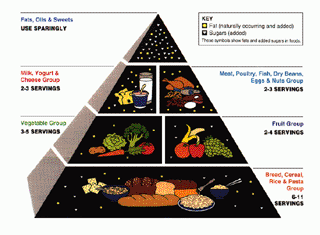

|
In Search of Health Good nutrition still
possible for todayís busy lifestyle [MARCH 3, 2000] "The news is full of conflicting ideas about what is good for us to eat. But despite the confusion, what we eat and donít eat really does make a difference to our health,Ē says Robin Rinker, director of nutrition services at Abraham Lincoln Memorial Hospital. ďGood nutrition doesnít have to be complicated. It doesnít mean you have to plan an elaborate meal, though it does take some thought and preparation. You can Ďgrab and goí and still eat nutritious foods.Ē
|
|
|
March is National Nutrition Month, a good time to think about the reasons many Americans donít eat healthful diets and discover what they can do about it. "People today live a busy lifestyle," Rinker says. "We are cooking less and less and eating out more and more. We donít have much time to exercise, and when we are hungry, high-calorie, high-fat food is cheap and easily available. We Midwesterners, especially, tend not to develop good eating habits because we are used to a diet heavy in meat. We may have seen some good information on nutrition, but we are too busy to really think about it." But good nutrition is even more important for people who are always on the run. So instead of strict diets with a lot of doís and doníts to remember, nutritionists today are concentrating on teaching general guidelines that todayís active Americans can follow more easily.
One of the best ways to be sure you are getting the nutrients you need is to increase your intake of fruits and vegetables. "We need about six servings each day," Rinker says. "That sounds like a lot, but a serving is only one-half cup or one small raw fruit. If you have a heaping serving of cooked vegetables at one meal, thatís two or three servings. If you snack on those enormous apples and bananas we find in the grocery stores these days, thatís another two or three servings. And the more variety, the better." In order to stay healthy, bring a "grab and go" lunch to work instead of eating out. "You can grab a bagel, a piece of fruit and some fresh vegetables and youíre out the door," she says. "Just donít put butter on the bagel." She also recommends taking a multiple vitamin and mineral supplement. "No matter how well you eat, you probably still need a supplement. An inexpensive brand of vitamins will work as well as the most expensive." She suggests checking with a doctor or a dietitian on vitamin brands. Just because you are taking a supplement, however, donít think you can ignore the fruits and vegetables because there are nutrients in fruits and vegetables that donít come in a vitamin pill. "Researchers keep discovering new benefits that can help prevent diseases such as cancer," she says. "There are probably nutrients in fruits and vegetables our bodies need that we donít even know about yet." Rinker recommends buying a variety of fruits and vegetables, either fresh or frozen, then listing these items and hanging the list on the refrigerator to remind yourself they are there. "Buying packaged, pre-cut vegetables makes it more likely that youíll use them," she notes. The best thing to remember is to drink six glasses of water each day. "Drinking plenty of water is vitally important," Rinker believes. "Few people know this, but if you donít have enough water you will tire more easily, especially if you are elderly. You may also become constipated. In extreme cases you will become dehydrated and end up in the hospital. And if you drink plenty of water, your skin will look much, much better. Water helps you more than you realize." Rinker keeps a glass of water on her desk when she is working and does not allow herself to have a coffee or juice in the morning until she has downed her first glass of water. For those who worry that six glasses of water will keep them busy all day looking for restrooms, she points out that the bladder will soon adjust to the extra water. Another guideline is to cut down on meat. "Eating a lot of meat is part of the way we Midwesterners grew up, but we need to cut down to two or three ounces a serving. We should even try for two or three meatless meals a week, using legumes such as beans and peas or soy products instead of so much meat. Soy foods are the coming thing. Like fruits and vegetables, they help us fight disease. At most meals, decrease the meat and add more vegetables." Limiting soft drinks to two a day will improve oneís nutrition, she says. Even non-cola drinks can leach calcium out of teeth and bones. Water is the best drink, she emphasizes.
|
Although the food pyramid recommended by the National Dietetic Association and the National Diabetes Association is a good guide to proper nutrition, she thinks many people donít understand it. "Itís not that difficult," she says. "You need to take some time to sit and study it, and you need to do that before you go to the grocery store. It can be a good tool for making sound nutritional choices." At the bottom of the pyramid are the foods we should eat the most of every dayógrains, beans and starchy vegetables. Six or more servings are recommended. Popular items in this category include bread (preferably whole wheat), bagels, buns, crackers, cereal, pasta, potatoes or rice. The next layer of the pyramid is fruits and vegetables. Three to five servings of vegetables and two to four servings of fruit are recommended. On the next level up are milk and meat. Two to three servings of each are suggested. Meat should be fish and poultry more often than beef or pork, with fat and skin removed. Meat substitutes can be cheese, eggs, peanut butter and tofu, a soy product. At the top of the pyramid are fats, sweets, and alcohol. These are the foods we should eat sparingly. The fats we choose should be mostly unsaturated, meaning fats that are liquid at room temperature. Saturated fats such as animal products, the ones that can clog our arteries, are usually solid at room temperature. Rinker points out that maintaining a consistent weight is important. "Yo-yo diets, where your weight fluctuates up and down, are not healthy. Americans today are confused about dieting, because so many of them have found that diets just donít work. We donít really know why some people gain weight and others donít, but we do know it isnít all a matter of willpower. In fact, some of the newest programs donít do weigh-ins or count calories. "Experts are trying to establish guidelines rather than strict rules. People today need to be realistic about their weight. Women and girls need to get over the idea that everyone has to be the size of a supermodel. We must learn to accept our bodies as they are, though we do need to maintain a healthy weight." Exercise, in conjunction with a healthy diet is crucial to weight control. Those who have trouble finding time for a regular exercise program should try to get in a little physical activity whenever possible. At work, climb stairs rather than take elevators and walk up and down the halls at break time. At present Rinker and her staff are researching new approaches to diet programs, and in the fall ALMH plants to have a completely new healthy weight control program to replace the "Lose to Win" diet classes the hospital has been offering.
Editorís Note: ALMH will have a booth at the Community Health Fair on March 25 and will hand out recipes for meatless meals and tips on ways to use soy products. The health fair will be held at the Lincoln Park District building on Primm Road from 9 a.m. to 2 p.m.
|

